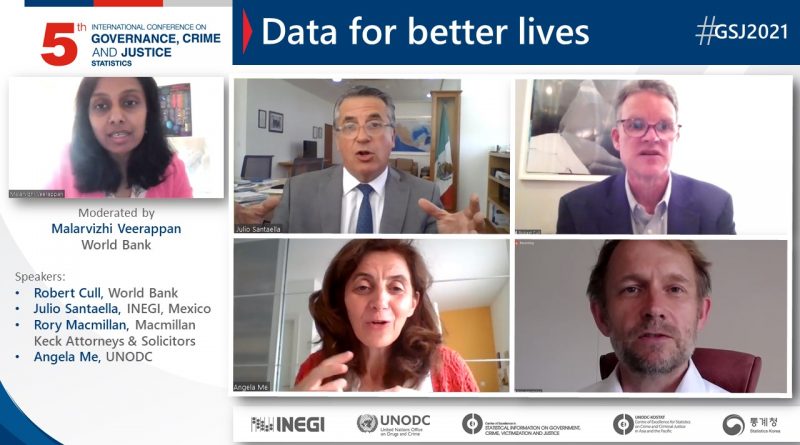Second day of GSJ2021: global challenges and local experiences
Mexico City, 15 June 2021. UNODC, through the Center of Excellence for Statistical Information on Crime, Government, Victimization and Justice (CoE) in Mexico, successfully concludes the second day of the 5th International Conference on Statistics of Governance, Security and Justice (GSJ2021).
The first session Asia and Pacific crime-data challenges focused on how to address regional issues of human trafficking in its different forms, corruption at the international, national and community levels, domestic violence, drug trafficking, violence and the impact of a pertinent measurement of data by the countries for the understanding of problems at a multidimensional level.
In the second session, Data for Better Lives, the approaches regarding the treatment and valuation of data and its relationship with governance, international systems, resource mobilization and financial services that can help us tackle problems such as corruption were discussed. It was highlighted that the development of structures and dialogues that materialize the tracking of information by all countries, as well as their exchange and cooperation, is a challenge in which we find ourselves and that governments, international cooperation, industries and societies face. This would help the processing of cross-border data and the fight against transnational organized crime, thus lightening the burden that is placed on governments and that affects the quality of life of societies.
The third session, Data, analysis and research to understand the infiltration of organized crime into the legal economy, delved into the possible patterns of corruption, victimization, types of extortion, money laundering, law enforcement data and methodologies of direct and indirect investigations, all of them organized crime activities. The relevance of the data, the time, the transactional spaces are some of the indicators that are being considered to create analyzes with a greater opportunity for disaggregation that can help us understand the complexity of the various scenarios.
In the fourth and final session, The gender perspective in crime & drug statistics: where do we stand?, it was discussed that, in terms of crime statistics, invisibility is an important problem for accounting for the participation of women in organized crime activities. Gender is essential to understand the biases of violence and how are the documentation processes of the countries, therefore it is necessary to reformulate the role of women within the activities of organized crime and thus be able to monitor the progress and proliferation of these activities. The gender perspective is the critical path for understanding the socio-economic impact, social and political stigma that has interfered in the analysis of the dynamics of women and governments. Policies to prevent and combat organized crime must have a differential analysis that broadens the knowledge that promotes the reduction of risks and damages to the world population.
We thank our panelists for their participation in this second day: Marika McAdam, Raymund E. Narag, Kilkon Ko, Robert Cull, Julio Santaella, Rory MacMillan, Angela Me, Patricio Estévez-Soto, Julia Mold, Rusudan Mikhelidze, Michele Riccardi, Alejandra Ríos Cázares, Cristina Fabre, Romi Sigsworth and Viviana Porto. Also, thanks to our moderators: Hyun Jung Park, Malarvizhi Veerppan, Alberto Aziani and Katherine Aguirre.
Visit the 5th International Conference on Governance, Crime and Justice Statistics 2021 website.



